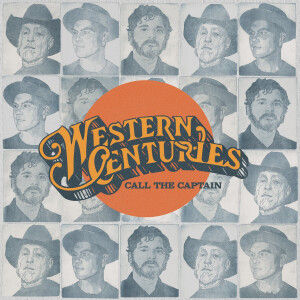 On their 2020 release as on their previous offerings, Western Centuries plug in and play rock ‘n’ roll with a country accent … or maybe they play country music like a rock ‘n’ roll band. Either way, it’s some of the best country music around.
On their 2020 release as on their previous offerings, Western Centuries plug in and play rock ‘n’ roll with a country accent … or maybe they play country music like a rock ‘n’ roll band. Either way, it’s some of the best country music around.
Western Centuries is built around three acclaimed singer-songwriters, all of whom contribute equally and have an equal say in the band … thus the title of this third release Call The Captain, an off-hand reference to the fact that this ship doesn’t have a captain. The three co-leaders are Cahalen Morrison, previously known for his folk music records with Eli West, Ethan Lawton, who played with Zoe Muth and the Lost High Rollers, among others, and Jim Miller, co-founder of the roots jam band Donna The Buffalo. Individually and as a group they’re steeped in bluegrass, old-time, folk, country, western swing and other roots music – as steeped as anybody on land or sea. On this album like the others they pretty much take turns singing their own songs, kind of like you’ll see in that Nashville institution the “guitar pull.”
On Call The Captain they continue pushing the envelope even further than they did on Weight of the World in 2016 and Songs from the Deluge in 2018. They’re singing a lot about life-and-death matters this time – religion, war, mortality in general. Maybe that’s why so many of the tracks ended up as soul songs. This is deep country soul like they make in Muscle Shoals and Memphis as well as Nashville, where it was recorded and mixed in the studio of Grammy-nominated producer Bill Reynolds, one of Nashville’s most innovative roots music producers. (The production and engineering are superb, by the way, all the instruments and vocals coming through sharp and clear.) The first three tracks in particular – Miller’s “Lifeblood Sold,” Lawton’s “Every Time It’s Raining” and Morrison’s “Barcelona Lighthouse” have soul elements like organ, funky basslines and chunking electric guitars, in addition to lots of pedal steel and fiddle. And everywhere there are solid three-part harmonies on the choruses.
“Even if there are drums, electric guitars, and synthesizers, we all like to come at the music in a similar way as we would approach a bluegrass song; supporting the lead singer, singing harmonies, and letting the instrumentalists be featured,” Morrison says.
Those instrumentalists include Nokosee Fields, better known as an award-winning old-time fiddle player, on bass guitar; Thomas Bryan Eaton on pedal steel on all 12 tracks; and Oliver Bates Craven on fiddle. Nashville stalwart Jim Lauderdale sings harmony on Miller’s satirically delightful rocker “Space Force,” inspired by the current President’s idea for a sixth branch of the armed services.
Early standouts on this one include Lawton’s hot country shuffle “No Cure” with a triple-fiddle instrumental break; Miller’s “The Sentinel,” a skewering of missionaries; and Lawton’s “Long Dreadful Hourney,” a country waltz that takes on the evils of colonialism and religious crusading. Morrison’s galloping “Dynamite Kid” digs into some of the history of New Mexico where he grew up – and musically is haunted by the ghost of Buddy Holly, who made many of his records with producer Norman Petty in Clovis. Lawton’s vocals are heavily reverbed to give it a dance-hall sound on “Sarah and Charlie,” a piano-driven rockabilly homage to honky-tonks. And probably my favorite is the closer, Miller’s “Heart Broke Syndrome,” With its soulful organ, funky bass, harmony-laden chorus and start-stop guitar lines, it reminds me of some of those great old Joe South songs like “Down In The Boondocks” and “Hush.”
Lord knows when anybody will get out on tour again with this coronavirus pandemic shutting down everything. But when Western Centuries comes to your vicinity, you should try to see them. They can really burn down the honky-tonk and get folks up on their feet and dancing. In the meantime, put on “Call The Captain” and dance across your own living room floor.
(Free Dirt, 2020)
